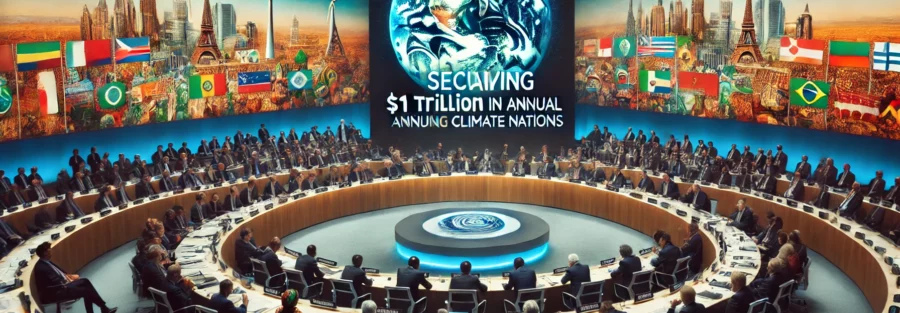**BAKU (Reuters)** – Negotiators at COP29 were urged on Thursday to either invest now to help poorer nations adapt to climate change or face higher costs in the future. Experts stressed that developing countries will need at least $1 trillion annually by the end of the decade to shift to renewable energy and protect against extreme weather events.
The issue of climate financing is a central focus of the COP29 talks in Azerbaijan, and the summit’s success will likely hinge on whether countries can agree on a new target for how much wealthier nations, development lenders, and the private sector should contribute each year to support climate action in the developing world.
The previous goal of $100 billion per year, which expires in 2025, was only partially met, with a two-year delay in reaching the target in 2022, according to the OECD. However, much of the funding came in the form of loans rather than grants, a practice that recipient countries have called for changing.
At the start of the talks, a report from the Independent High-Level Expert Group on Climate Finance highlighted that by 2035, the annual financing target should rise to $1.3 trillion, or even higher if progress remains slow in the coming years. “Any shortfall in investment before 2030 will create greater challenges in the years that follow, leading to a steeper and more expensive path to achieving climate stability,” the report warned.
“Delaying action now will only increase the costs later,” it added.
Behind the scenes, negotiators are working on draft texts for a potential deal. However, early documents from the United Nations climate body show a wide divergence in viewpoints, with no clear indication of where the talks might end up. Some negotiators have said that the latest draft on finance is too lengthy and are awaiting a more concise version before negotiations can progress.
A potential deal is expected to be contentious, as many Western governments, who have been committed to financing since the Paris Agreement in 2015, are reluctant to increase their contributions without greater commitments from countries like China.
The anticipated withdrawal of the United States from any future funding agreements under a potential Trump administration has further complicated talks, putting additional pressure on delegates to find alternative ways to secure the necessary funds.
One possibility being explored is the role of multilateral development banks, like the World Bank, which are funded by wealthier nations and are undergoing reforms to allow for increased lending capacity. A coalition of 10 major development banks has already proposed boosting their climate finance by 60%, aiming for $120 billion annually by 2030, with at least $65 billion coming from the private sector.
The idea of raising new funds through taxes on polluting industries—such as aviation, shipping, and fossil fuels, or through financial transaction taxes—has gained traction, with more countries signaling their willingness to consider such measures. However, it’s unlikely that a consensus on this approach will be reached at this summit.
On Thursday, Zakir Nuriyev, head of the Association of Banks of Azerbaijan, announced that the country’s 22 banks had committed nearly $1.2 billion to finance projects aimed at helping Azerbaijan transition to a low-carbon economy.





